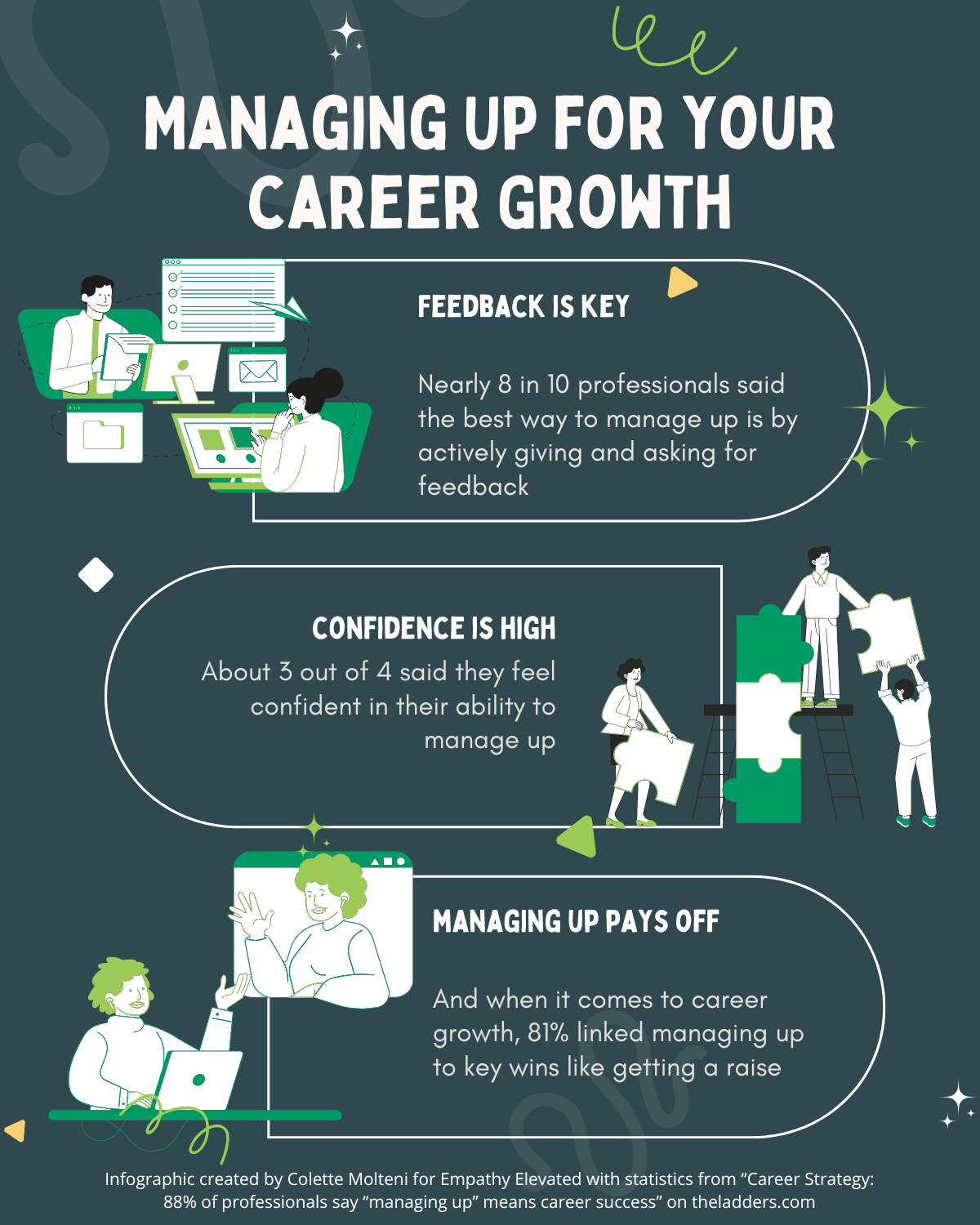This is
- your weekly guide and shortcut to mastering emotional intelligence through the power of empathy. I recently wrote about The Thing We Forget When We’re Fed Up
It's Monday, and you have not finished your second cup of coffee yet, but you are about to.
Brandon from Marketing blurts out, "I agree 1000%!". He feels the need to almost scream it out as if the leadership team on the call cannot hear him through their computer audio. You might spit out your coffee,
The way he always sucks up is cringe.
It's not genuine. You can't possibly be the only one who can tell.
He thinks it's why he got his last promotion. No, it's because it was a great year!
But as does Brandon, it's not a bad idea to have leadership in your good graces.
You prefer a lead with heart approach to a fake one. But how do you do this with your leadership team and manage to get things done in the way you need them to be?

Respect, Not Flattery: The Smart Way to Manage up
The redundant flattery like what Bradon did rarely will work unless you are working for an absolute narcist. The good news is that most people are not narcissistic!
Respect is the way to go, the smart way.
But how do you get respect, both ways?
I once worked for a leader who usually had a genuine small to help but also could be firm with unpopular directives. She had a relatively calm demeanor and, even under pressure, only wavered slightly. She had a knack for relationship management and building bridges across various teams, which helped her get things done when collaboration arose. She was honored time and time again by those above, and her subordinates were absolutely respected.
How?
She let me in on her secret: be easy to work with.
Have you ever dreaded sending that email or Slack message to someone because you felt like you were on eggshells? Is that respect, or fear?
This simple skill of being easy to work with is not limited to the tech world. It is applicable across most industries.
But let's say you are a software developer in tech, and you have to explain the ins and outs of your code to a less technical person. If you have the patience to answer questions and strong emotional intelligence in your listening and perceptions of the individual you are talking to, you are probably considered easier to work with.
If you are the developer who gets disgruntled after two questions, do you think your manager will willingly listen to your input when you are trying to "manage u""?
No, the "person who is easy to work with already has their foot in the door.
The secret to gaining leadership
I had a senior leader on the warpath who was ready to approve proceeding with a new application that had been quietly sold to him over a golf outing.
The more technical folks and I knew it was a no-go!
We first pleaded with him to reconsider, but he would not hear of it.
It was time to manage up. I started gathering the feedback in a centralized location and attaching it to show why the application would not achieve this senior leader's goals. Our decision from the technical side was fairly set, but now we needed to get everyone on board.
As Travis Bradberry and Jean Greaves explain in "Emotional Intelligence 2.0", you have to "Explain "our decisions, not just make them" (p. 208". Before returning to this senior leader with disjointed feedback, we needed a real explanation that would make sense to him.
The consolidated email was sent. A conversation followed several hours after he had time to absorb it and was calm. He began having doubts about the application's forward path but remained on the fence.
Now, there was an opening to manage up.
I found external documentation relaying the same concerns we had with the application.
Managing up worked, but he did not move forward with that application. We were spared having to work with a dinosaur of a product!

From Order-Taker to Trusted Advisor
This is a good sign if your manager or another leader is brainstorming or confiding with you. It means you are most likely a trusted advisor, regardless of your title. Leadership takes you seriously, and managing up will be more like managing across efficiently.
But how do you get here?
Yes, you have a running to-do list and projects to juggle, but you do not just sit there like a robot taking orders. You take the initiative.
Did someone express discomfort with something you sent them? You get curious and ask to see how you can resolve their concerns. You do not just let it sit because they did not tell you directly to fix it.
See a process or code being shared that could be improved? You speak up in the right place and time and take ownership to make impactful change.
If you sit there and just wait for orders or direct instructions like you are reading a Lego kit assembly model, you will not become a trusted advisor.
As part of your professional development goals, seek to be a trusted advisor. When you are managing up, it is rarely a challenge, for regardless of your title, your objectives are already trusted.

Why Managing Up is just Empathy in Action
Managing up at the end of the day is empathy in action.
EmpathyEmpathy in communication makes you can make you easier to work with. After all, who wants to be the source of an almost always painful conversation?
You own a solution to a problem you have spotted. You know your surroundings and can empathize with those dealing with a troublesome process.
You are trusted because you innovate and change even when you are not directly prompted. You do not rest on your laurels, so to speak.
You move in empathy, so empathy is returned, and managing up is not a struggle, but rather an open conversation for change.
✅ What I’ve been Analyzing this week (reading, watching, listning, etc.)
📖 I’m reading the “The Courage to Be Disliked: The Japanese Phenomenon That Shows You How to Change Your Life and Achieve Real Happiness” by Ichiro Kishimi and Fumitake Koga. I like to be liked, as most people do, but I know I need to better accept that not all will, and be at peace with it.
☁️This photo of the week from the AP captured my eye, showing the clouds reflecting on a lake
✍️ I commented on a post by
on the actionable advice she provides, in particular for women in the workforce and the delicate balance we face in being assertive.Want more on Empathy and Emotional Intelligence to Elevate your career? 📈
I empower💪tech people to elevate their empathy, to accelerate their careers




Early in my career, I fell into the trap of authority bias, believing leaders were infallible and unquestionable. It wasn’t until I stepped into a leadership role myself that I realized how much leaders rely on their teams to manage up effectively. We all make mistakes, and creating an environment where feedback flows freely—rooted in empathy, as you describe—helps everyone grow and achieve better outcomes.
Sometimes, people suck up because of "how a place presents itself". The best form of management is empathy and that's how to also become a trusted advisor.